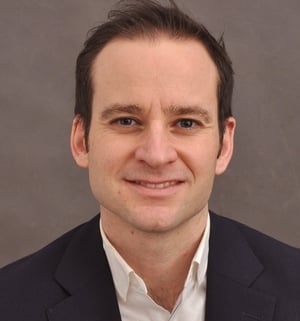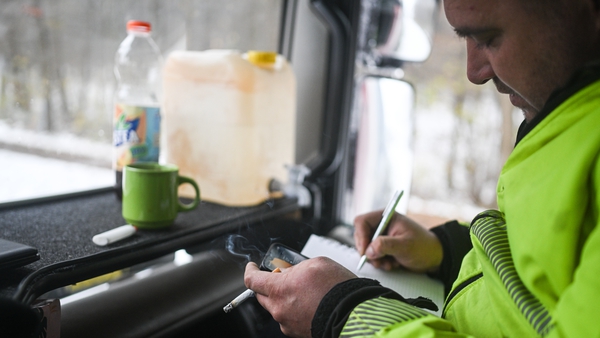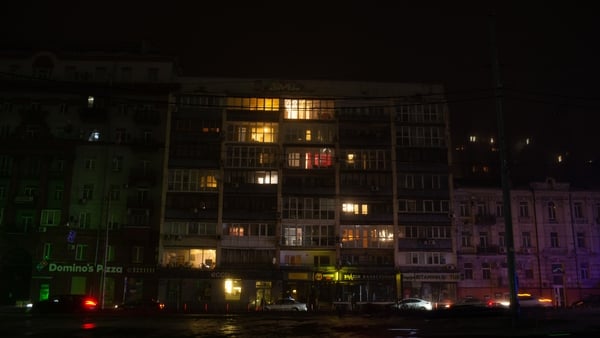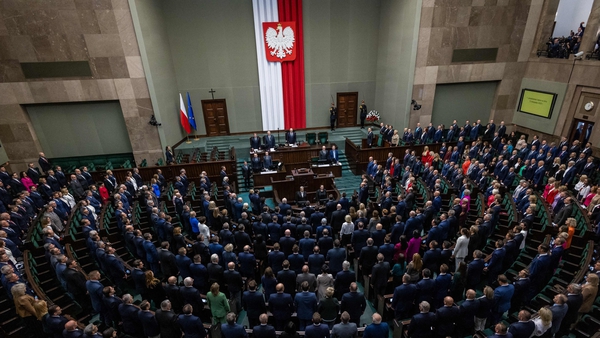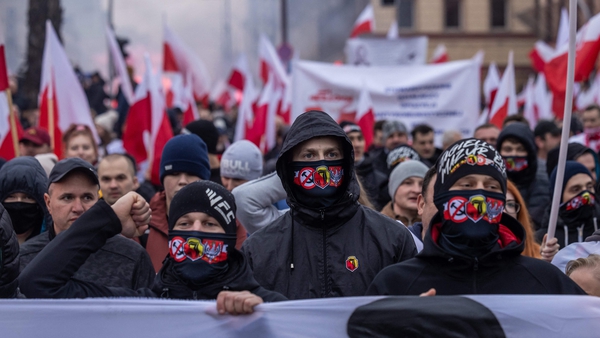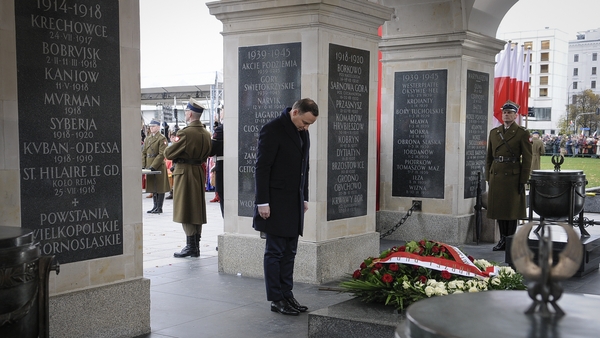As a teenager, Viktoria Pogrebniak visited the European Commission building in Brussels on a European Union-sponsored youth initiative.
The 28-year-old Ukrainian activist, who now lives in Warsaw, remembers that "every country had their own translators".
"I thought, well, at some point in our life, probably Ukraine will also have a room with a Ukrainian translator and everybody will be adoring our language," Ms Pogrebniak told RTÉ News.
The trip to Brussels made an impression on her at the time.
So too did the pro-democracy Euromaidan protests that began in November 2013.
Ms Pogrebniak remembers watching the television news with friends in her school dormitory as Ukraine's former pro-Russian President Viktor Yanukovych announced that he was withdrawing Ukraine from an association agreement with the EU.
She did not understand why Ukraine was changing course.
"Russia was not bringing us freedom of speech. In fact, it brings the opposite."
That winter, Ukrainians, both young and old, occupied Kyiv's Maidan Square to demand democratic reforms and expressed their hope that one day their country would join the EU.
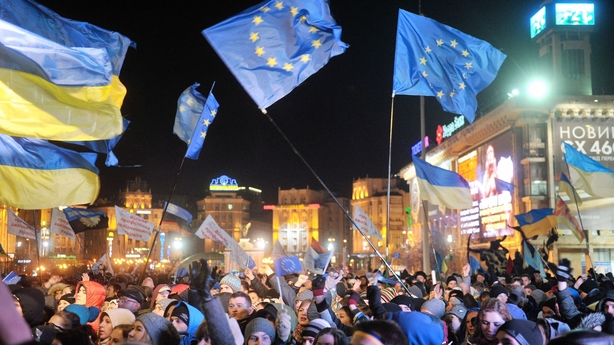
Ten years on from Euromaidan, Ukraine is much farther down the road towards gaining EU membership, but at great human cost.
For many Ukrainians, including the country's President Volodymyr Zelensky, the promise of EU membership remains essential to ensuring the future of their country's democracy.
Russia's invasion and 20 months of war has fast-tracked Ukraine’s bid to join the club - it was granted candidate status by the European Commission in June 2022 on the basis that seven key criteria are met, a set of wide-ranging reforms to bring the country in line with EU administrative norms.
They include combatting corruption, reducing the influence of Ukraine’s powerful oligarchs, reforming the judiciary, ensuring media freedom and protecting the rights of minorities.
Ukraine would be unlikely to join the bloc while the war is still ongoing.
"Today is a historic day because today the commission recommends that the council opens accession negotiations with Ukraine and with Moldova," European Commission president Ursula von der Leyen said.
At that stage, Kyiv had passed two of the seven criteria: introducing legislation to reform two of the country's highest courts and ensuring that media independence met EU standards.
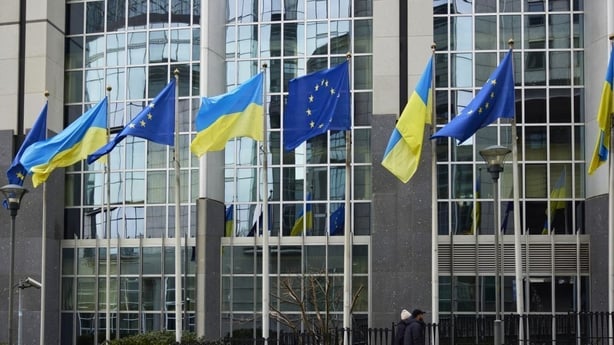
The rest of the criteria still needed "progress", a Commission report noted.
Rooting out corruption is a main concern for EU legislators.
According to Transparency International, Ukraine ranked 116th out of 180 countries in its Global Corruption Barometer in 2022 - a worrying score for an EU applicant country.
It is a problem that Mr Zelensky has tried to tackle during the war.
In January this year a number of senior officials, including regional governors, resigned amid a series of corruption allegations, some involving the supply of war materials and reconstruction projects.
And, in August, Mr Zelensky sacked more than 30 senior army recruitment officials for alleged corrupt practices.
The National Anti-Corruption Bureau of Ukraine (NABU) has launched 300 cases so far this year and is currently focusing its attention on wartime corruption.
The appointment of new directors of both NABU and the Specialised Anti-Corruption Prosecutor’s Office was demanded by the Commission last year in order for Ukraine to meet its application requirements.
The country’s justice ministry is also pursuing a number of current cases against oligarchs for fraud and money laundering charges, and has seized sizeable assets.
New legislation introduced in 2021 has made it easier to access financial documents and attain witnesses, reducing the ability of oligarchs to influence political decisions.
Germany’s foreign minister Annalena Baerbock told reporters last week at a conference in Berlin that she was confident Ukraine’s membership bid would be advanced at the EU leader's summit next month.
Then last weekend, Ms von der Leyen made a surprise visit to Kyiv, her sixth since the start of the war.
Dear President @ZelenskyyUA, we are impressed by the reforms Ukraine has made in the midst of a war.
— Ursula von der Leyen (@vonderleyen) November 4, 2023
I am confident that you can complete the outstanding reforms very soon.
If this happens, Ukraine can reach its ambitious goal. pic.twitter.com/ydD97QAZAf
Ms von der Leyen said that Ukraine had "already completely way over 90%" of the steps to start accession talks.
Speaking at a meeting of EU foreign ministers in Kyiv last month, Tánaiste Micheál Martin told reporters that Ireland "has been very supportive of Ukraine’s accession application to join the European Union", and reaffirmed Ireland’s commitment to EU enlargement.
The meeting was a first of its kind outside of the EU’s borders.
If and when Ukraine joins the EU, it will become the bloc’s largest country by land mass and its largest agricultural producer.
Recent disputes between Ukraine and its eastern EU neighbours over imports of its grain expose how tricky it will be to accommodate such a large food producer into the common agricultural policy.
Ukraine would be represented in the European Parliament by more than 50 MEPs, similar to Poland.
The experience of six Western Balkan countries, all of whom applied to join the EU before Ukraine, shows how long the application process can take even after formal accession talks begin.
North Macedonia (when it was the Former Yugoslav Republic of Macedonia) first applied for EU membership in 2004. It started formal accession talks with the EU last year.
Ms Pogrebniak, who organises events for Euromaidan-Warsaw, a civil society group that works towards Ukrainian-European integration, said she is hoping for positive news from the report.
"We want to join quickly," she said, adding that it needs "goodwill" from both sides.
Addressing Ukraine’s parliament, the Verkhovna Rada, last Saturday, Ms von der Leyen said that all of Europe owed Ukraine a deep gratitude.
"You are fighting not only for your freedom, your democracy and your future, but for ours too. You are fighting for Europe."
It is a message that senior EU officials have repeated since the start of Russia’s invasion.
Ukrainians welcome words of solidarity but many also want to know that membership is going to become a reality.
Additional reporting Reuters

